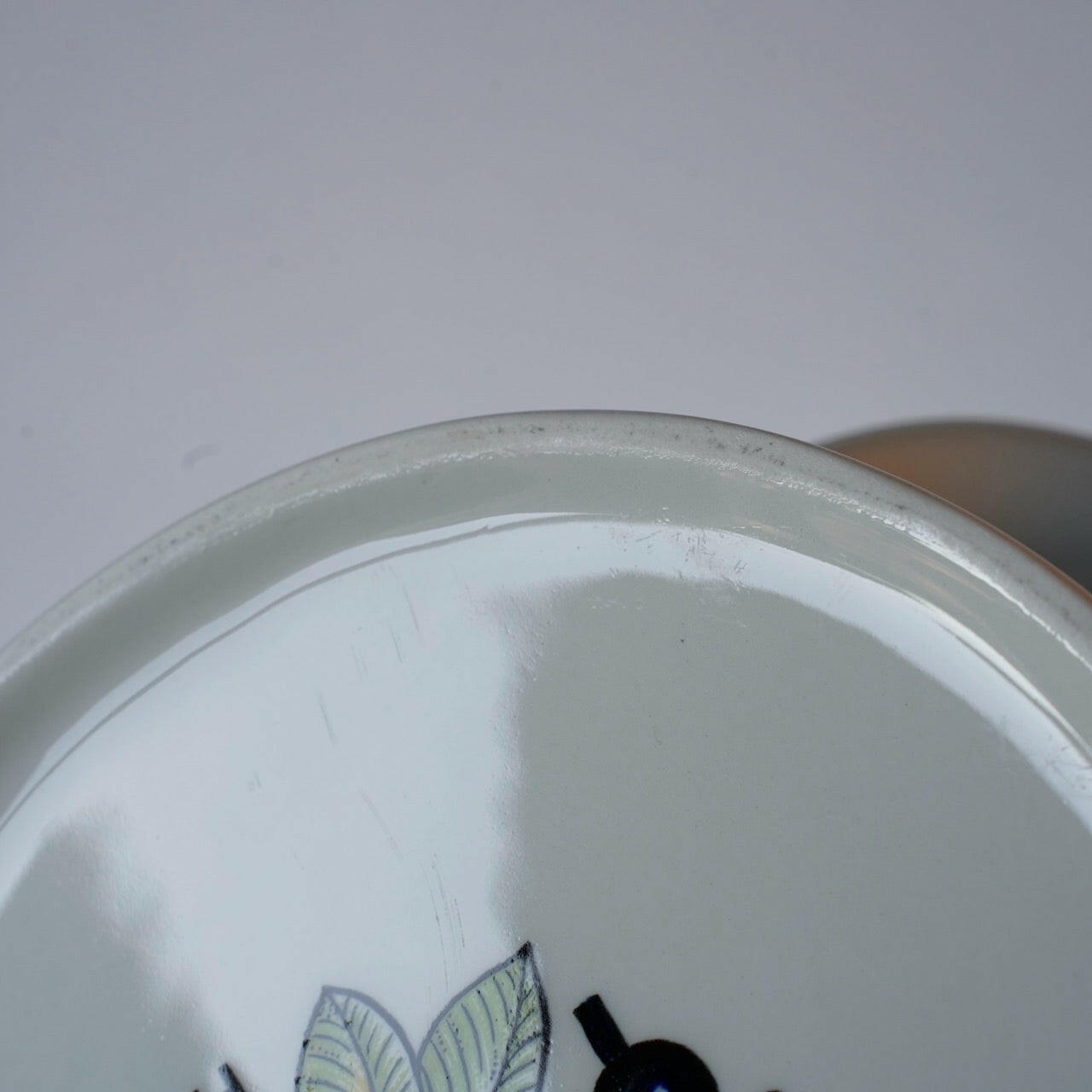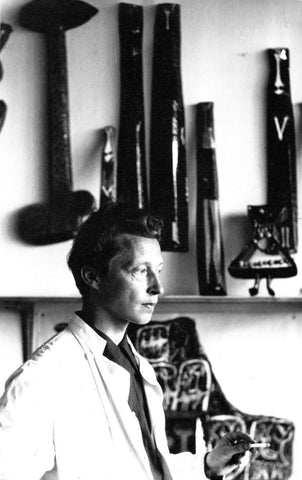ARABIA
Rare [Viola logo] Arabia (ARABIA) Paratisi (Paratiisi) Thulin
Rare [Viola logo] Arabia (ARABIA) Paratisi (Paratiisi) Thulin
Couldn't load pickup availability
This is a vintage soup turin (heater) from Arabia's famous Paratissi. This is the original Thulin manufactured in Finland from 1969 to 1971. It is characterized by a picture of a viola on the back stamp. It is a collector's item called so-called old paratissi.
This original soup turin has the year and month engraved on the back stamp. 9-70 indicates that it was manufactured in September 1970. This size of turin has not been reprinted and is only available as a vintage item.
■Details Manufacturer: ARABIA / Arabia Designer: Birger Kaipiainen / Birger Kaipiainen Series name: Paratiisi / Paratiisi Year: September 1970 Country of origin: Finland Condition: ★★★★☆ (4.5: Very good condition)
This is an extremely beautiful item with no cracks, chips, penetrations, etc., and no history of use. There are some preservation scratches on the bottom, and there is a slight chip on the inside of the lid. There is some discoloration, which means it was caused by the manufacturing process and was shipped as is. There are no cutlery marks on the inner bottom, and it is in excellent condition as a dead stock product. This is an excellent vintage piece with great color.




























Paratiisi ~ Finland's paradise ~

"Paratiisi" is a masterpiece created by Birger Kaipiainen, a famous designer of ARABIA. The series name means "paradise" in Finnish. After some trial and error by Kaipiainen, Paratissi was launched in 1969. Each piece of Paratissi was decorated with a richly colored print, making it one of the most elaborate and luxurious series of Arabic tableware of the time. Production ceased in 1974 due to the severe economic recession and fuel shortage caused by the oil crisis.
Paratissi is also known for its frequently changing logo, called a backstamp. 1) A logo that started with the viola (pansy) logo in 1969, 2) A logo that abolished the year stamp in the first half of 1971, and 3) A leaf that replaced the viola part produced around the second half of 1971 with the ARABIA mark. logo, 4) Crown logo, which was replaced with a circular English logo in the 1988 reprint, 5) Black and white logo from mid-2000, with the color of the 1988 logo removed, and 6) Made in Thailand, with the circle mark further removed. There are 6 types of logos. Until the mid-2000 logo, it will be made in Finland. The important thing to know is that the Thai made logo does not have "FINLAND" stamped on it.

In particular, the reprint editions of Paratissi from the mid-2000s onward are characterized by their darker decorations and thick design lines that make them easy to understand. Vintage items up to 1988 have pale colors and thin lines, giving a sense of depth throughout. Vintage tableware is more beautiful as tableware.
ARABIA - Arabia

ARABIA is a ceramic manufacturer representing Finland in the 20th century. Originally, ARABIA was a factory established in Finland by Sweden's Rörstrand as a base for producing pottery for Russia. The company's name comes from the fact that it was established in the Arabian district of Helsinki, the capital.
From the 1950s to the 1980s, many world-famous designers such as Ulla Procoppe, Birger Kaipiainen, Laiya Uosikkinen, and Esteri Tomura created many works, known as the Golden Age of ARABIA. Works that had a great influence on modern modern design were created at the time, from simple Scandinavian modern designs to highly decorative and well-crafted pieces. ARABIA is known for its masterpieces such as paratissi, crocus, flora, and corari, which are both practical and decorative items unique to Scandinavian tableware that are useful for both interior and everyday use.
Birger Kaipiainen

Birger Kaipiainen (1915-1988)
Born in Pori, southwestern Finland, on the coast of the Gulf of Bothnia. Finland's leading designer, known as the "King of Decorators". Although he moved to the capital, Helsinki, when he was a child, Kaipiainen spends every summer with a homestay in the Russian town of Sortavala. The sense of nature and artistry cultivated there would influence him throughout his life. In his prime, Kaipiainen suffered from polio, which forced him to walk with a cane for the rest of his life. Due to a disability in one hand, he was unable to turn the potter's wheel and make pottery by himself, but this experience is said to have inspired him to hone his unique artistic sense.
Kaipiainen graduated from Aalto University's Faculty of Art, Finland's top art university, and began working at ARABIA in 1937 , before also transferring to Sweden's Rorstrand for four years from 1954 . During the heyday of simple and unadorned modern Scandinavian art, Kaipiainen's designs were rich in ornamentation and characterized by detailed depictions drawn in every corner. He has created a unique worldview that stands out from the mainstream of the time, designing Paratisch in 1969 , Apia in 1970 , and Sunnuntai in 1971 . These are still Arabia's reprints and are their signature products.
Collapsible content
Accepted payment methods
- Various credit cards
- Apple pay, Google Pay, Paypal
- Convenience store settlement
- Bank transfer
- Smartphone payment (QR code payment)
Arrive the day after shipping
Our shipping location is Shiga Prefecture. Domestic areas, excluding Hokkaido, Okinawa Prefecture, remote islands, and parts of Tohoku, will arrive the day after the shipping notification (except in the case of bad weather, etc.).
vintage rating
See below for more information on rating conditions using stars.
About the size of the product
Product photos are close-ups so that you can see the condition well. Therefore, the actual product may appear smaller. The wooden spoon is for size comparison, not an accessory, and is 13 cm long.
about shipping cost
The shipping fee is a flat rate of 900 yen ( free shipping for purchases over 10,000 yen ).
*Shipping fee for Hokkaido and Okinawa is 1,400 yen (free shipping for purchases over 13,000 yen).
International Shipping
We are offering international shipping to over 100 locations. Enjoy free shipping when you spend 200,000 JPY or more.
































